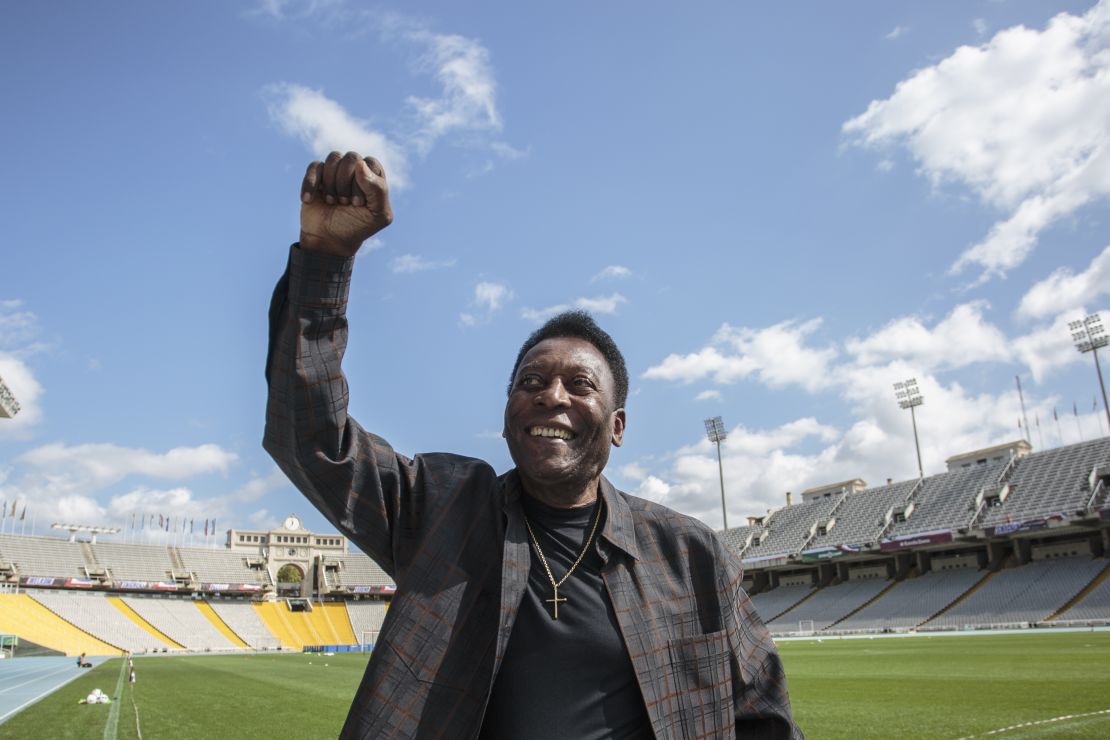Few players have touched the game of soccer like Pele.
The Brazilian, who turned 80 on Friday, is still considered as one of the greatest players to ever play the game and remains the only man in history to win three World Cups.
Even those who don’t follow football know his name; it’s synonymous with the sport – and his legacy remains as strong as ever.
But before he was Pele, he was Edson Arantes do Nascimento. Born in 1940 in Tres Coracoes, an inland city about 350 kilometers (220 miles) northwest of Rio de Janiero, he grew up poor, honing his craft playing barefoot with improvised balls made of coconuts or balls of socks.
Pele credits his humble beginnings for his mastery of the sport.
Whatever he did, it worked. By age 14, he started off playing juniors for Sao Paulo’s Baura Athletic Club. Pele found his professional home two years later at the namesake club in the coastal city of Santos and, except for a late-career stint with the New York Cosmos, he never left.
He averaged nearly a goal a game – 619 over 638 appearances – for the Brazilian club, quickly earning a reputation as one of the best players ever produced in the country.
READ: ‘Phenomenon’ Kylian Mbappe lives up to billing as the new Pele

Global icon
But Pele became and remains a global icon.
His ascent began in 1958, when the then-17-year-old burst onto the scene at the World Cup.
A teenage Pele scored Brazil’s lone goal in its quarterfinal win, notched a hat-trick in the semifinals against France, then netted two more goals in a 5-2 victory over Sweden in the final. Brazil won the World Cup again in 1962, even after Pele went down with a thigh injury.
However, it was all disappointment four years later, when a hobbled Pele and his national teammates bowed out of the tournament in the first round.
They get their shot at redemption in 1970, when a 29-year-old Pele inspired his country to victory in front of more than 100,000 onlookers at Mexico City’s Estadio Azteca.
After becoming a national hero, Pele decided to conquer America as well, signing a $1.4 million a year contract with the Cosmos.
He made a big splash in the emerging league and helped draw fellow international football luminaries like George Chinaglia and Franz Beckenbauer stateside.
READ: 1970 World Cup-winning team remains Brazil’s greatest ever
Even after retiring, Pele remains in the spotlight through international product endorsements and as an outspoken public figure.
He continued to be recognized not just for his athleticism, but also for calling government policies and championing the poor in Brazil – people just like him, so many decades ago.
In 2000, FIFA named the man known as “The Black Pearl” and simply “The King” as its Player of the Century, an honor he shared with Argentina’s Diego Maradona.
Zico, one of the Brazilian standouts who followed in Pele’s footsteps, said the honor shouldn’t have been in question, nor should it have been shared.
“This debate about the player of the century is absurd,” Zico said. “There’s only one possible answer: Pele. He’s the greatest player of all time, and by some distance I might add.”
READ: Neymar surpasses Ronaldo’s goal tally and closes in on Pele’s all-time record
Health concerns
Earlier this year there were fears over Pele’s health but the Brazilian played down reports he was suffering from depression.
According to his son, the 79-year-old had become reclusive following complications as he recovered from hip surgery.
Though Pele still requires the aid of a walking frame to get around, the Brazil great says he remains in high spirits and dismissed suggestions that his health had let him to be depressed.
“This depression thing, I don’t know if they got it wrong because in the last two years I had a bruise, a femur operation and then, when I started training or making a commercial, I had to stop,” Pele told CNN Brasil’s Reinaldo Gottino.
“They started to worry and I really appreciate it, but then they invented that I was depressed. I got here with a walker but, thank God, I only can’t ride a bike. Even some of the times when I was hurt, bruised, I did not fail to give an interview and I said that I was sad because I had been injured.
“That is exactly what I am going to talk about now: I would rather have arrived here without a walker, doing a little training, playing ball. But I’m recovering and, thank God, after everything I’ve done in sports, I’m fine. Thank goodness I’m recovering.”
When asked at which point during his illustrious career – which spanned more than 20 years – he realized he would become one of the game’s greats, Pele admits his own success took even him by surprise.
“This question is difficult to answer, I never thought I was going to be great. I swear to God,” Pele said.
Eliott McLaughlin contributed to this report.





















